2024届高考英语阅读理解高频词组课件(六)(共33张PPT)
文档属性
| 名称 | 2024届高考英语阅读理解高频词组课件(六)(共33张PPT) |  | |
| 格式 | pptx | ||
| 文件大小 | 6.1MB | ||
| 资源类型 | 教案 | ||
| 版本资源 | 通用版 | ||
| 科目 | 英语 | ||
| 更新时间 | 2024-05-29 20:14:09 | ||
图片预览


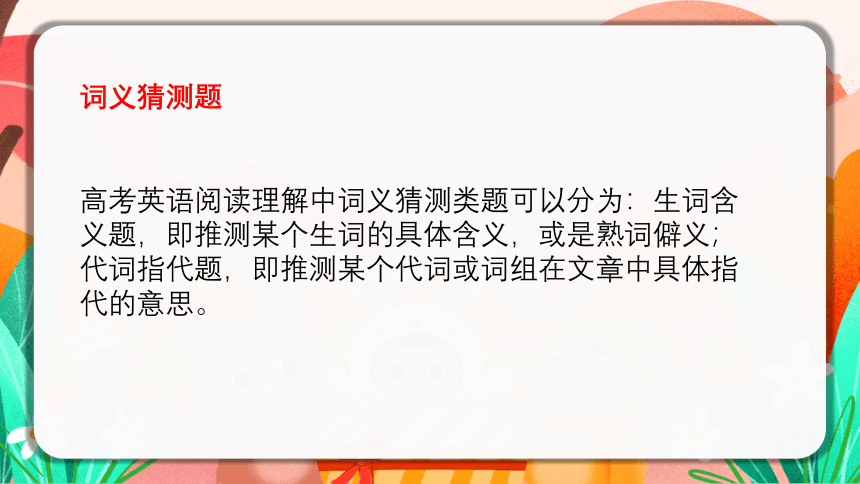
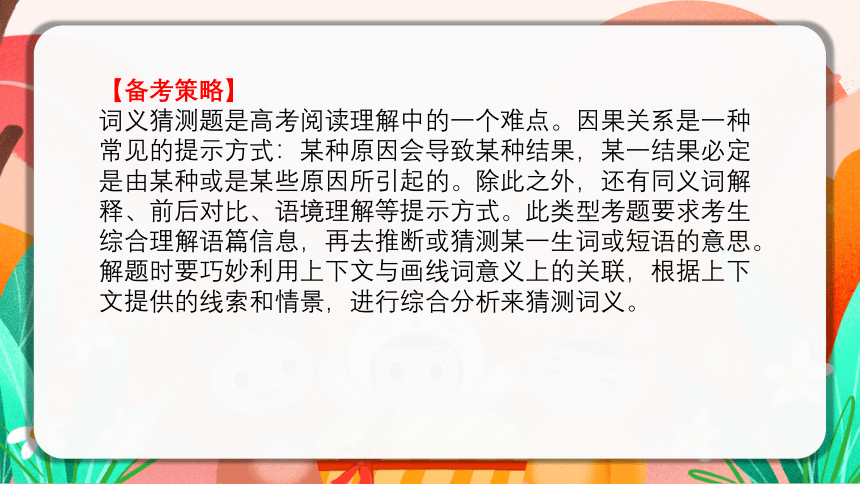
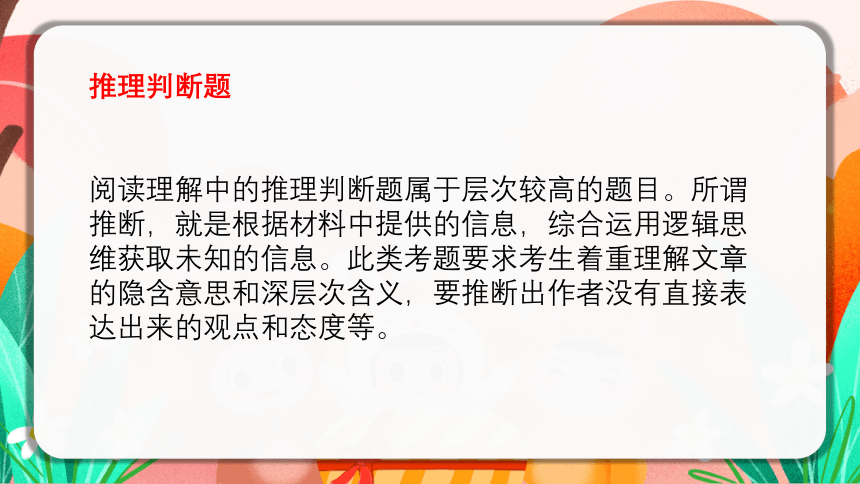
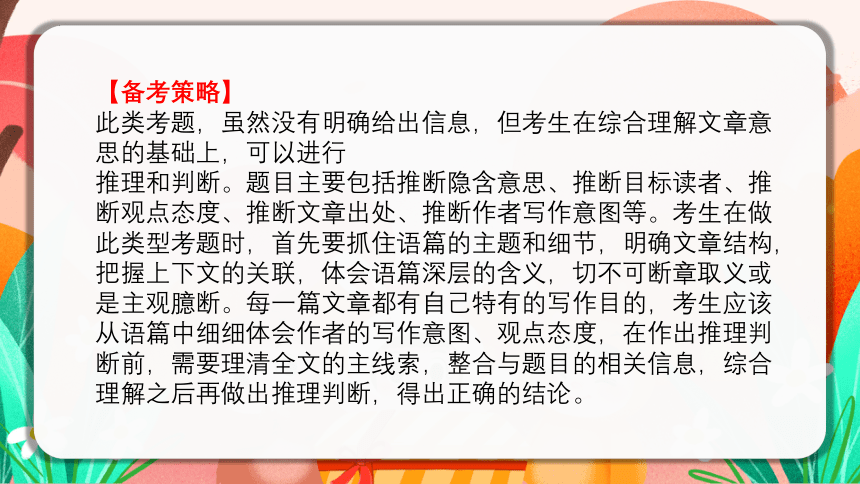
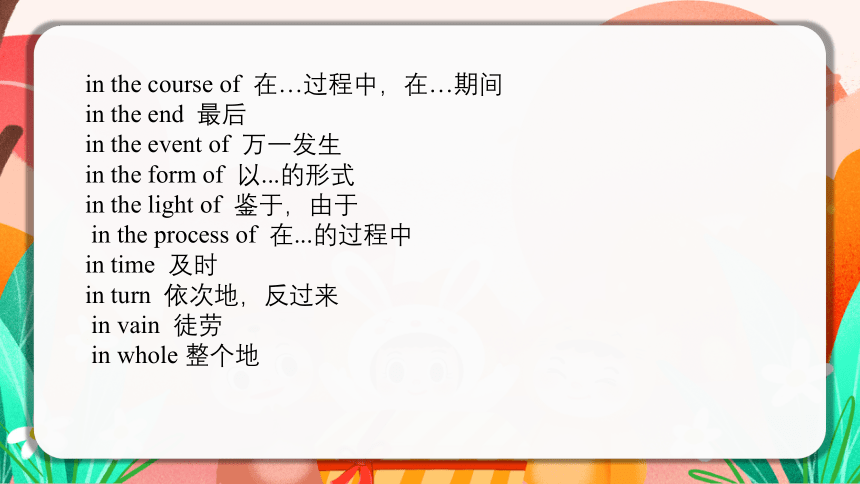
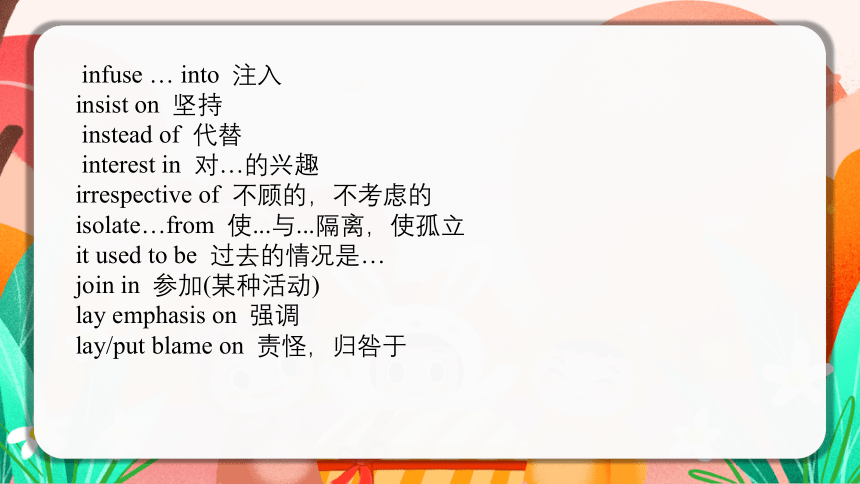
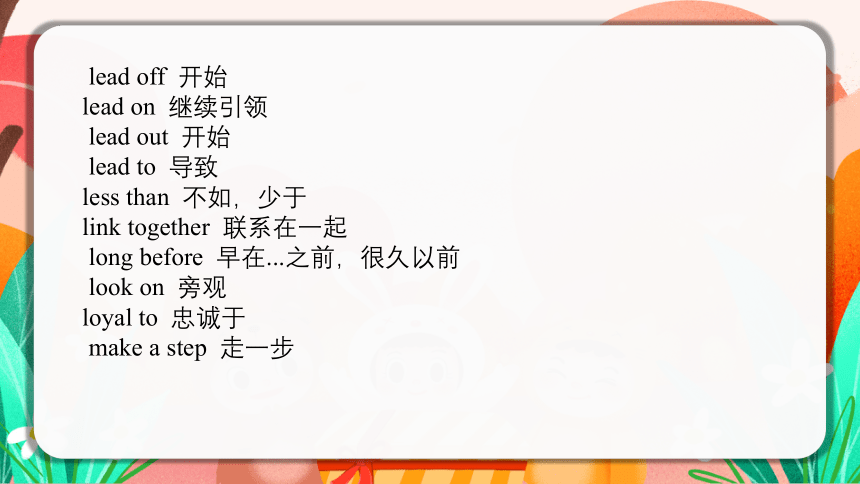

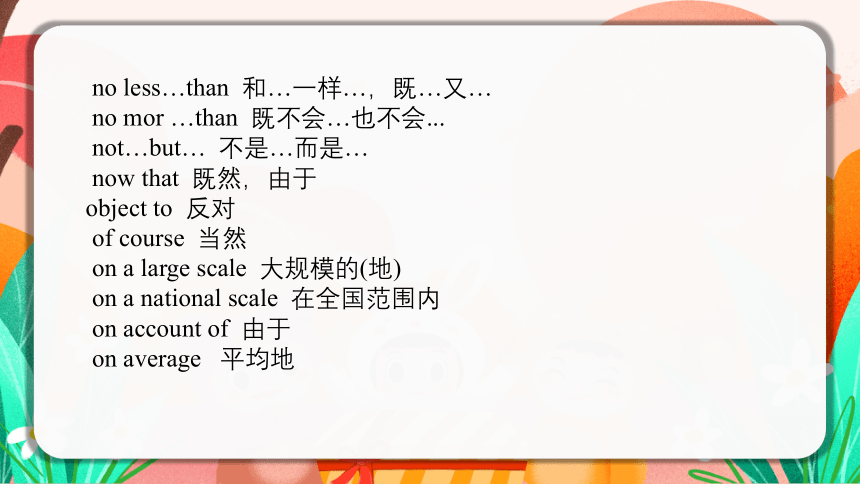
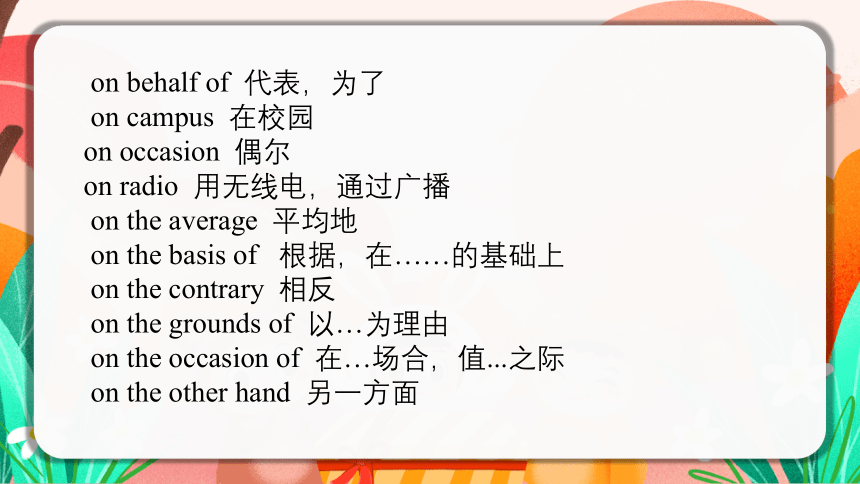
文档简介
(共33张PPT)
高考英语阅读理解
高频词组(六)
题型分析
01
词义猜测题
高考英语阅读理解中词义猜测类题可以分为:生词含义题,即推测某个生词的具体含义,或是熟词僻义;代词指代题,即推测某个代词或词组在文章中具体指代的意思。
【备考策略】
词义猜测题是高考阅读理解中的一个难点。因果关系是一种常见的提示方式:某种原因会导致某种结果,某一结果必定是由某种或是某些原因所引起的。除此之外,还有同义词解释、前后对比、语境理解等提示方式。此类型考题要求考生综合理解语篇信息,再去推断或猜测某一生词或短语的意思。解题时要巧妙利用上下文与画线词意义上的关联,根据上下文提供的线索和情景,进行综合分析来猜测词义。
推理判断题
阅读理解中的推理判断题属于层次较高的题目。所谓推断,就是根据材料中提供的信息,综合运用逻辑思维获取未知的信息。此类考题要求考生着重理解文章的隐含意思和深层次含义,要推断出作者没有直接表达出来的观点和态度等。
【备考策略】
此类考题,虽然没有明确给出信息,但考生在综合理解文章意思的基础上,可以进行
推理和判断。题目主要包括推断隐含意思、推断目标读者、推断观点态度、推断文章出处、推断作者写作意图等。考生在做此类型考题时,首先要抓住语篇的主题和细节,明确文章结构,把握上下文的关联,体会语篇深层的含义,切不可断章取义或是主观臆断。每一篇文章都有自己特有的写作目的,考生应该从语篇中细细体会作者的写作意图、观点态度,在作出推理判断前,需要理清全文的主线索,整合与题目的相关信息,综合理解之后再做出推理判断,得出正确的结论。
in the course of 在…过程中,在…期间
in the end 最后
in the event of 万一发生
in the form of 以...的形式
in the light of 鉴于,由于
in the process of 在...的过程中
in time 及时
in turn 依次地,反过来
in vain 徒劳
in whole 整个地
infuse … into 注入
insist on 坚持
instead of 代替
interest in 对…的兴趣
irrespective of 不顾的,不考虑的
isolate…from 使...与...隔离,使孤立
it used to be 过去的情况是…
join in 参加(某种活动)
lay emphasis on 强调
lay/put blame on 责怪,归咎于
lead off 开始
lead on 继续引领
lead out 开始
lead to 导致
less than 不如,少于
link together 联系在一起
long before 早在...之前,很久以前
look on 旁观
loyal to 忠诚于
make a step 走一步
make for 有助于,有利于
make one's way 前进,行进
make out 弄懂,辨认出
make sure 查明,确保
make towards 朝…走去
make way 开路,让路
mean by …的意思,…意味着
more…than... 与其说…不如说…
more than 不仅,不止,多于
much as 虽然,尽管
no less…than 和…一样…,既…又…
no mor …than 既不会…也不会...
not…but… 不是…而是…
now that 既然,由于
object to 反对
of course 当然
on a large scale 大规模的(地)
on a national scale 在全国范围内
on account of 由于
on average 平均地
on behalf of 代表,为了
on campus 在校园
on occasion 偶尔
on radio 用无线电,通过广播
on the average 平均地
on the basis of 根据,在……的基础上
on the contrary 相反
on the grounds of 以…为理由
on the occasion of 在…场合,值...之际
on the other hand 另一方面
on the radio 通过广播,无线电广播中
on the side 额外地,作为兼职
on the side of 在…一边
on the whole 总的来看
on time 准时
one another 相互
one or other 不管哪一个
only if 只要,只有
other than 除了
out of step 不一致,不协调
out of the question 不可能的
out of use 不使用
owe…to… 把…归功于...
pass out 分发,昏倒
pass off 中止,停止
pass on 传递
pass by 去世
pay attention to 注意
pay by check 用支票支付
pay in cash/pay cash 付现金
pay off 偿清,取得好结果
persist in 坚持
pick up 捡起,学会,接
plan for 为...订计划
point to 指向
properly speaking 正确(公正)地讲
provided that 假若,倘如
put together 加在一起;
put up with 忍受
quite other 完全不同的
rather than 而不是
refer to 提到,参考
reflect discredit on 使丧失名誉
reflect on 思考,反省
rely on 依靠,指望
remove…from… 把…从…去掉,撤职
responsible for 对...负责
result from 由…产生
result in 导致
ripe for 为...做好准备
root out 发现
run a risk 冒风险
sacrifice something to 为…牺牲某事
secure sth. from attack 确保…免受攻击
set about 开始,着手
set aside 留出
set back 推迟,延缓
set down 放下,记下
set forth 阐明,陈述
set off 出发,使爆炸
set out 陈列,显示,启程
share with 与...分享
shoot a film 拍摄一个镜头
side with站 在...一边,支持
similar to 与...相似
since then 从那时起
something like 大约,有几分像…
sooner than 早于
speed up 加速
stand for 代表
step up 增加,加速
stick to 坚持,坚持,遵循
stimulated by 受...的刺激
stir up 激起,挑起
such as 比方说,例如
support for 对…的支持
sure enough 果然
take away 拿走,夺走
take a step 采取措施
take advantage of 利用
take away 消耗,清除
take care of 照顾
take...for 把...看作...
take in 接受,吸收,欺骗
take on 呈现,从事
take over 接管
take to 开始喜欢,开始从事,开始沉湎于
take up with 开始和...来往
take up 占据,从事
thanks to 由于,幸亏
the bulk of… 的主要部分,大多数
the former…the latter… 前者…,后者...
to…extent 在…范围,到…程度
to caution against 对…予以警告
to center around 以…为中心
to some extent 某种程度上
to such an extent that 到...的程度,以至
to turn sth. into 把…转换为...
together with 一起
transition to 向…的过渡,向…的转变
turn away 走开,转过脸
turn over 翻过来
turn round 转过身来
turn to 求助于
turn up 调大,出现
what is more 而且
with regard to 关于
with that 说罢
with the exception of 除...外
with…speed 以…的速度
work away 一直在工作
work out 解决,算出,制定出
work up 逐步建立,逐步发展
worse than 坏于…
write in 提出书面要求
write off 报废,勾销
write out 写出,取消某角色
模拟练习
02
Since English biologist Charles Darwin published On the Origin of Species in 1859, scientists have vastly improved their knowledge of natural history. However, a lot of information is still of the speculation, and scientists can still only make educated guesses at certain things.One subject that they guess about is why some 400 million years ago, animals in the sea developed limbs (肢) that allowed them to move onto and live on land.Recently, an idea that occurred to the US paleontologist (古生物学家) Alfred Romer a century ago became a hot topic once again.Homer thought that tidal (潮汐的) pools might have led to fish gaining limbs. Sea animals would have been forced into these pools by strong tides. Then, they would have been made either to adapt to their new environment close to land or die. The fittest among them grew to accomplish the transition (过渡) from sea to land.Romer called these earliest four-footed animals “tetrapods”. Science has always thought that this was a credible theory, but only recently has there been strong enough evidence to support it.
Hannah Byrne is an oceanographer (海洋学家) at Uppsala University in Sweden. She announced at the 2018 Ocean Sciences Meeting in Oregon, US, that by using computer software, her team had managed to link Homer’s theory to places where fossil deposits (沉积物) of the earliest tetrapods were found.According to the magazine Science, in 2014, Steven Balbus, a scientist at the University of Oxford in the UK, calculated that 400 million years ago, when the move from land to sea was achieved, tides were stronger than they are today. This is because the planet was 10 percent closer to the moon than it is now.The creatures stranded in the pools would have been under the pressure of “survival of the fittest”, explained Mattias Green, an ocean scientist at the UK’s University of Bangor. As he told Science, “After a few days in these pools, you become food or you run out of food... the fish that had large limbs had an advantage because they could flip (翻转) themselves back in the water.”As is often the case, however, there are others who find the theory less convincing. Cambridge University’s paleontologist Jennifer Clark, speaking to Nature magazine, seemed unconvinced. “It’s only one of many ideas for the origin of land-based tetrapods, any or all of which may have been a part of the answer,” she said.
12. Who first proposed the theory that fish might have gained limbs because of tidal pools
A. Alfred Romer. B. Charles Darwin.C. Hannah Byrne. D. Steven Balbus.
13. Why were tides stronger 400 million years ago than they are today according to Steven Balbus
A. There were larger oceans.
B. Earth was closer to the moon.
C. The moon gave off more energy.
D. Earth was under greater pressure.
14. The underlined word “stranded” in Paragraph 8 probably means “________”.
A. found B. settledC. abandoned D. trapped
15. What is the focus of the article
A. The arguments over a scientific theory.
B. The proposal of a new scientific theory.
C. Some new evidence to support a previous theory.
D. A new discovery that questions a previous theory.
【答案】12. A 13. B 14. D 15. C【解析】本文为一篇科学报道。文章用一些新的证据来支持先前人们的猜测理论:即海洋中的动物是因为潮汐的作用导致鱼类发展出四肢,迁徙到陆地的。12. 细节理解题。根据第三Recently, an idea that occurred to the US paleontologist (古生物学家) Alfred Romer a century ago became a hot topic once again.和四段第一句“Homer thought that tidal (潮汐的) pools might have led to fish gaining limbs.”可知,是Alfred Romer最先提出了鱼类可能因为潮汐而发展出四肢的理论。故选A项。13. 细节理解题。根据第七段最后“…tides were stronger than they are today. This is because the planet was 10 percent closer to the moon than it is now.(过去的潮汐比现在强。这是因为地球这颗行星以前比现在离月球近了10%。)可知,B项正确。
14、D
15. 主旨大意题。根据文章全文可知,英国生物学家达尔文的《物种起源》极大地提高了科学家对自然的认识。但仍有不少没有根据的猜测。其中的一个猜测就是为什么在4亿年前,海洋中的动物有了四肢,从而让他们迁徙到陆地上生活。一个世纪以前,美国古生物学家Alfred Romer提出的一个想法,即潮汐可能导致鱼类发展出四肢,这再次成为一个热门话题。针对此许多科学家进行的实验提供了许多新的证据来证实它。C项(一些新的证据来支持先前的理论。)是文章的关注点,故选C。
Could the device, smartphone or PC, which you re using affect the moral decisions you make when using it To test it, researchers presented multiple dilemmas to a sample set of 1,010 people. The participants were assigned a device at random.One case of the questions participants were asked is the classic “trolley(有轨电车) problem”: A runaway trolley is headed towards five people tied up on a-set of train tracks. You can do nothing, resulting in the deaths of five people, or push a man off a bridge, which will stop the trolley. The practical response is to kill one man to save five lives, which 33. 5 percent of smartphone users chose, compared to 22.3 percent of PC users.
“What we round in our study is that when people used a smartphone to view classic moral problems, they were more likely to make more unemotional, reasonable decisions when presented with a highly emotional dilemma, “Dr Albert Barque-Duran, the lead author of the study, told City, University of London. “This could be due to the increased time pressure often present with smartphones and also the increased psychological distance which can occur when we use such devices compared to PCs.”As for why the researchers started this study, Dr Barque-Duran noted, “Due to the fact that our social lives, work and even shopping take place online, it is important to think about how the contexts where we typically face moral decisions and are asked to engage in moral behavior have changed, and the impact this could have on the hundreds of millions of people who use such devices daily. “it’s clear that we need more research on how our devices affect our moral decision making because we’re using screens at an ever increasing rate.
8. Why did the author mention the trolley problem
A. To introduce a difficult problem to readers.‘
B. To introduce the aim of carrying out the study.
C. To show an example of the questions in the study
D. To show the difficulty in dealing with dilemmas.
9. How do the smartphone users of the study behave in dealing with emotional dilemmas
A. Calmly. B. Cruelly.C. Hesitantly. D. Enthusiastically.
10. Dr Albert believes that compared with PCs, smartphones .
A. help people bear more pressure
B. help people make decisions quick
C. make people feel more mentally distant
D. make people stay happier to solve problems
11. What can we infer from the text
A. Shopping online has a great effect on making moral decisions.
B. The people using smartphones are more than those using PCs.
C. People who often use smartphones or PCs always meet with dilemmas
D. It is common for people to be involved in making moral decisions in daily life.
【答案】8. C 9. A 10. C 11. D【解析】本文是一篇科普类文章。你所使用的手机或电脑设备能否影响你的道德决策?为此,研究者对1,010位参与者做了研究。8. 推理判断题。根据文章第二段One case of the questions participants were asked is the classic “trolley (有轨电车) problem”可以推断出,作者提及到电车问题,只是展示了研究中问题中的一个例子。故选C。9. 细节理解题。根据文章第三段What we found in our study is that when people used a smartphone to view classic moral problems, they were more likely to make more unemotional, reasonable decisions when presented with a highly emotional dilemma可知,处理情感困境,手机使用者更能够镇定的处理。故选A。10. 细节理解题。根据文章第三段This could be due to the increased time pressure often present with smartphones and also the increased psychological distance which can occur when we use such devices compared to PCs.可知,与电脑相比较,手机更使人感到精神上的疏远。故选C。11. 推理判断题。根据文章最后一段It’s clear that we need more research on how our devices affect our moral decision making because we’re using screens at an ever-increasing rate可知,在日常生活中,人们参与道德决策是很普遍的。
thanks
高考英语阅读理解
高频词组(六)
题型分析
01
词义猜测题
高考英语阅读理解中词义猜测类题可以分为:生词含义题,即推测某个生词的具体含义,或是熟词僻义;代词指代题,即推测某个代词或词组在文章中具体指代的意思。
【备考策略】
词义猜测题是高考阅读理解中的一个难点。因果关系是一种常见的提示方式:某种原因会导致某种结果,某一结果必定是由某种或是某些原因所引起的。除此之外,还有同义词解释、前后对比、语境理解等提示方式。此类型考题要求考生综合理解语篇信息,再去推断或猜测某一生词或短语的意思。解题时要巧妙利用上下文与画线词意义上的关联,根据上下文提供的线索和情景,进行综合分析来猜测词义。
推理判断题
阅读理解中的推理判断题属于层次较高的题目。所谓推断,就是根据材料中提供的信息,综合运用逻辑思维获取未知的信息。此类考题要求考生着重理解文章的隐含意思和深层次含义,要推断出作者没有直接表达出来的观点和态度等。
【备考策略】
此类考题,虽然没有明确给出信息,但考生在综合理解文章意思的基础上,可以进行
推理和判断。题目主要包括推断隐含意思、推断目标读者、推断观点态度、推断文章出处、推断作者写作意图等。考生在做此类型考题时,首先要抓住语篇的主题和细节,明确文章结构,把握上下文的关联,体会语篇深层的含义,切不可断章取义或是主观臆断。每一篇文章都有自己特有的写作目的,考生应该从语篇中细细体会作者的写作意图、观点态度,在作出推理判断前,需要理清全文的主线索,整合与题目的相关信息,综合理解之后再做出推理判断,得出正确的结论。
in the course of 在…过程中,在…期间
in the end 最后
in the event of 万一发生
in the form of 以...的形式
in the light of 鉴于,由于
in the process of 在...的过程中
in time 及时
in turn 依次地,反过来
in vain 徒劳
in whole 整个地
infuse … into 注入
insist on 坚持
instead of 代替
interest in 对…的兴趣
irrespective of 不顾的,不考虑的
isolate…from 使...与...隔离,使孤立
it used to be 过去的情况是…
join in 参加(某种活动)
lay emphasis on 强调
lay/put blame on 责怪,归咎于
lead off 开始
lead on 继续引领
lead out 开始
lead to 导致
less than 不如,少于
link together 联系在一起
long before 早在...之前,很久以前
look on 旁观
loyal to 忠诚于
make a step 走一步
make for 有助于,有利于
make one's way 前进,行进
make out 弄懂,辨认出
make sure 查明,确保
make towards 朝…走去
make way 开路,让路
mean by …的意思,…意味着
more…than... 与其说…不如说…
more than 不仅,不止,多于
much as 虽然,尽管
no less…than 和…一样…,既…又…
no mor …than 既不会…也不会...
not…but… 不是…而是…
now that 既然,由于
object to 反对
of course 当然
on a large scale 大规模的(地)
on a national scale 在全国范围内
on account of 由于
on average 平均地
on behalf of 代表,为了
on campus 在校园
on occasion 偶尔
on radio 用无线电,通过广播
on the average 平均地
on the basis of 根据,在……的基础上
on the contrary 相反
on the grounds of 以…为理由
on the occasion of 在…场合,值...之际
on the other hand 另一方面
on the radio 通过广播,无线电广播中
on the side 额外地,作为兼职
on the side of 在…一边
on the whole 总的来看
on time 准时
one another 相互
one or other 不管哪一个
only if 只要,只有
other than 除了
out of step 不一致,不协调
out of the question 不可能的
out of use 不使用
owe…to… 把…归功于...
pass out 分发,昏倒
pass off 中止,停止
pass on 传递
pass by 去世
pay attention to 注意
pay by check 用支票支付
pay in cash/pay cash 付现金
pay off 偿清,取得好结果
persist in 坚持
pick up 捡起,学会,接
plan for 为...订计划
point to 指向
properly speaking 正确(公正)地讲
provided that 假若,倘如
put together 加在一起;
put up with 忍受
quite other 完全不同的
rather than 而不是
refer to 提到,参考
reflect discredit on 使丧失名誉
reflect on 思考,反省
rely on 依靠,指望
remove…from… 把…从…去掉,撤职
responsible for 对...负责
result from 由…产生
result in 导致
ripe for 为...做好准备
root out 发现
run a risk 冒风险
sacrifice something to 为…牺牲某事
secure sth. from attack 确保…免受攻击
set about 开始,着手
set aside 留出
set back 推迟,延缓
set down 放下,记下
set forth 阐明,陈述
set off 出发,使爆炸
set out 陈列,显示,启程
share with 与...分享
shoot a film 拍摄一个镜头
side with站 在...一边,支持
similar to 与...相似
since then 从那时起
something like 大约,有几分像…
sooner than 早于
speed up 加速
stand for 代表
step up 增加,加速
stick to 坚持,坚持,遵循
stimulated by 受...的刺激
stir up 激起,挑起
such as 比方说,例如
support for 对…的支持
sure enough 果然
take away 拿走,夺走
take a step 采取措施
take advantage of 利用
take away 消耗,清除
take care of 照顾
take...for 把...看作...
take in 接受,吸收,欺骗
take on 呈现,从事
take over 接管
take to 开始喜欢,开始从事,开始沉湎于
take up with 开始和...来往
take up 占据,从事
thanks to 由于,幸亏
the bulk of… 的主要部分,大多数
the former…the latter… 前者…,后者...
to…extent 在…范围,到…程度
to caution against 对…予以警告
to center around 以…为中心
to some extent 某种程度上
to such an extent that 到...的程度,以至
to turn sth. into 把…转换为...
together with 一起
transition to 向…的过渡,向…的转变
turn away 走开,转过脸
turn over 翻过来
turn round 转过身来
turn to 求助于
turn up 调大,出现
what is more 而且
with regard to 关于
with that 说罢
with the exception of 除...外
with…speed 以…的速度
work away 一直在工作
work out 解决,算出,制定出
work up 逐步建立,逐步发展
worse than 坏于…
write in 提出书面要求
write off 报废,勾销
write out 写出,取消某角色
模拟练习
02
Since English biologist Charles Darwin published On the Origin of Species in 1859, scientists have vastly improved their knowledge of natural history. However, a lot of information is still of the speculation, and scientists can still only make educated guesses at certain things.One subject that they guess about is why some 400 million years ago, animals in the sea developed limbs (肢) that allowed them to move onto and live on land.Recently, an idea that occurred to the US paleontologist (古生物学家) Alfred Romer a century ago became a hot topic once again.Homer thought that tidal (潮汐的) pools might have led to fish gaining limbs. Sea animals would have been forced into these pools by strong tides. Then, they would have been made either to adapt to their new environment close to land or die. The fittest among them grew to accomplish the transition (过渡) from sea to land.Romer called these earliest four-footed animals “tetrapods”. Science has always thought that this was a credible theory, but only recently has there been strong enough evidence to support it.
Hannah Byrne is an oceanographer (海洋学家) at Uppsala University in Sweden. She announced at the 2018 Ocean Sciences Meeting in Oregon, US, that by using computer software, her team had managed to link Homer’s theory to places where fossil deposits (沉积物) of the earliest tetrapods were found.According to the magazine Science, in 2014, Steven Balbus, a scientist at the University of Oxford in the UK, calculated that 400 million years ago, when the move from land to sea was achieved, tides were stronger than they are today. This is because the planet was 10 percent closer to the moon than it is now.The creatures stranded in the pools would have been under the pressure of “survival of the fittest”, explained Mattias Green, an ocean scientist at the UK’s University of Bangor. As he told Science, “After a few days in these pools, you become food or you run out of food... the fish that had large limbs had an advantage because they could flip (翻转) themselves back in the water.”As is often the case, however, there are others who find the theory less convincing. Cambridge University’s paleontologist Jennifer Clark, speaking to Nature magazine, seemed unconvinced. “It’s only one of many ideas for the origin of land-based tetrapods, any or all of which may have been a part of the answer,” she said.
12. Who first proposed the theory that fish might have gained limbs because of tidal pools
A. Alfred Romer. B. Charles Darwin.C. Hannah Byrne. D. Steven Balbus.
13. Why were tides stronger 400 million years ago than they are today according to Steven Balbus
A. There were larger oceans.
B. Earth was closer to the moon.
C. The moon gave off more energy.
D. Earth was under greater pressure.
14. The underlined word “stranded” in Paragraph 8 probably means “________”.
A. found B. settledC. abandoned D. trapped
15. What is the focus of the article
A. The arguments over a scientific theory.
B. The proposal of a new scientific theory.
C. Some new evidence to support a previous theory.
D. A new discovery that questions a previous theory.
【答案】12. A 13. B 14. D 15. C【解析】本文为一篇科学报道。文章用一些新的证据来支持先前人们的猜测理论:即海洋中的动物是因为潮汐的作用导致鱼类发展出四肢,迁徙到陆地的。12. 细节理解题。根据第三Recently, an idea that occurred to the US paleontologist (古生物学家) Alfred Romer a century ago became a hot topic once again.和四段第一句“Homer thought that tidal (潮汐的) pools might have led to fish gaining limbs.”可知,是Alfred Romer最先提出了鱼类可能因为潮汐而发展出四肢的理论。故选A项。13. 细节理解题。根据第七段最后“…tides were stronger than they are today. This is because the planet was 10 percent closer to the moon than it is now.(过去的潮汐比现在强。这是因为地球这颗行星以前比现在离月球近了10%。)可知,B项正确。
14、D
15. 主旨大意题。根据文章全文可知,英国生物学家达尔文的《物种起源》极大地提高了科学家对自然的认识。但仍有不少没有根据的猜测。其中的一个猜测就是为什么在4亿年前,海洋中的动物有了四肢,从而让他们迁徙到陆地上生活。一个世纪以前,美国古生物学家Alfred Romer提出的一个想法,即潮汐可能导致鱼类发展出四肢,这再次成为一个热门话题。针对此许多科学家进行的实验提供了许多新的证据来证实它。C项(一些新的证据来支持先前的理论。)是文章的关注点,故选C。
Could the device, smartphone or PC, which you re using affect the moral decisions you make when using it To test it, researchers presented multiple dilemmas to a sample set of 1,010 people. The participants were assigned a device at random.One case of the questions participants were asked is the classic “trolley(有轨电车) problem”: A runaway trolley is headed towards five people tied up on a-set of train tracks. You can do nothing, resulting in the deaths of five people, or push a man off a bridge, which will stop the trolley. The practical response is to kill one man to save five lives, which 33. 5 percent of smartphone users chose, compared to 22.3 percent of PC users.
“What we round in our study is that when people used a smartphone to view classic moral problems, they were more likely to make more unemotional, reasonable decisions when presented with a highly emotional dilemma, “Dr Albert Barque-Duran, the lead author of the study, told City, University of London. “This could be due to the increased time pressure often present with smartphones and also the increased psychological distance which can occur when we use such devices compared to PCs.”As for why the researchers started this study, Dr Barque-Duran noted, “Due to the fact that our social lives, work and even shopping take place online, it is important to think about how the contexts where we typically face moral decisions and are asked to engage in moral behavior have changed, and the impact this could have on the hundreds of millions of people who use such devices daily. “it’s clear that we need more research on how our devices affect our moral decision making because we’re using screens at an ever increasing rate.
8. Why did the author mention the trolley problem
A. To introduce a difficult problem to readers.‘
B. To introduce the aim of carrying out the study.
C. To show an example of the questions in the study
D. To show the difficulty in dealing with dilemmas.
9. How do the smartphone users of the study behave in dealing with emotional dilemmas
A. Calmly. B. Cruelly.C. Hesitantly. D. Enthusiastically.
10. Dr Albert believes that compared with PCs, smartphones .
A. help people bear more pressure
B. help people make decisions quick
C. make people feel more mentally distant
D. make people stay happier to solve problems
11. What can we infer from the text
A. Shopping online has a great effect on making moral decisions.
B. The people using smartphones are more than those using PCs.
C. People who often use smartphones or PCs always meet with dilemmas
D. It is common for people to be involved in making moral decisions in daily life.
【答案】8. C 9. A 10. C 11. D【解析】本文是一篇科普类文章。你所使用的手机或电脑设备能否影响你的道德决策?为此,研究者对1,010位参与者做了研究。8. 推理判断题。根据文章第二段One case of the questions participants were asked is the classic “trolley (有轨电车) problem”可以推断出,作者提及到电车问题,只是展示了研究中问题中的一个例子。故选C。9. 细节理解题。根据文章第三段What we found in our study is that when people used a smartphone to view classic moral problems, they were more likely to make more unemotional, reasonable decisions when presented with a highly emotional dilemma可知,处理情感困境,手机使用者更能够镇定的处理。故选A。10. 细节理解题。根据文章第三段This could be due to the increased time pressure often present with smartphones and also the increased psychological distance which can occur when we use such devices compared to PCs.可知,与电脑相比较,手机更使人感到精神上的疏远。故选C。11. 推理判断题。根据文章最后一段It’s clear that we need more research on how our devices affect our moral decision making because we’re using screens at an ever-increasing rate可知,在日常生活中,人们参与道德决策是很普遍的。
thanks
